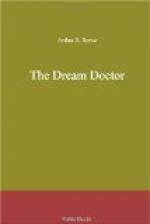From ship to ship we journeyed until at last we came to one on which, down in the chain locker, we found a false floor with a locker under that. There was a compartment six feet square and in it lay, neatly packed, fourteen large hermetically sealed cylinders, each full of the little oblong tins such as Kennedy had picked up the other day—forty thousand dollars’ worth of the stuff at one haul, to say nothing of the thousands that had already been landed at one place or another.
It had been a good day’s work, but as yet it had not caught the slayer or cleared up the mystery of Bertha Curtis. Some one or something had had a power over the girl to lure her on. Was it Clendenin? The place in Forty-fourth Street, on inquiry, proved to be really closed as tight as a drum. Where was he?
All the deaths had been mysterious, were still mysterious. Bertha Curtis had carried her secret with her to the grave to which she had been borne, willingly it seemed, in the red car with the unknown companion and the goggled chauffeur. I found myself still asking what possible connection she could have with smuggling opium.
Kennedy, however, was indulging in no such speculations. It was enough for him that the scene had suddenly shifted and in a most unexpected manner. I found him voraciously reading practically everything that was being printed in the papers about the revival of the tong war.
“They say much about the war, but little about the cause,” was his dry comment. “I wish I could make up my mind whether it is due to the closing of the joints by O’Connor, or the belief that one tong is informing on the other about opium smuggling.”
Kennedy passed over all the picturesque features in the newspapers, and from it all picked out the one point that was most important for the case which he was working to clear up. One tong used revolvers of a certain make; the other of a different make. The bullet which had killed Bertha Curtis and later Nichi Moto was from a pistol like that of the Hep Sings.
The difference in the makes of guns seemed at once to suggest something to Kennedy and instead of mixing actively in the war of the highbinders he retired to his unfailing laboratory, leaving me to pass the time gathering such information as I could. Once I dropped in on him but found him unsociably surrounded by microscopes and a very sensitive arrangement for taking microphotographs. Some of his negatives were nearly a foot in diameter, and might have been, for all I knew, pictures of the surface of the moon.
While I was there O’Connor came in. Craig questioned him about the war of the tongs.
“Why,” O’Connor cried, almost bubbling over with satisfaction, “this afternoon I was waited on by Chin Jung, you remember?—one of the leading merchants down there. Of course you know that Chinatown doesn’t believe in hurting business and it seems that he and some of the others like him are afraid that if the tong war is not hushed up pretty soon it will cost a lot—in money. They are going to have an anniversary of the founding of the Chinese republic soon and of the Chinese New Year and they are afraid that if the war doesn’t stop they’ll be ruined.”




